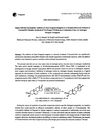 June 2008 in “Dermatologic Surgery”
June 2008 in “Dermatologic Surgery” The International Society of Hair Restoration Surgery created a standard curriculum in 2008 to guide doctors in diagnosing and treating hair loss effectively.
 6 citations,
May 2020 in “JAMA Ophthalmology”
6 citations,
May 2020 in “JAMA Ophthalmology” Using 5-alpha-reductase inhibitors, drugs for prostate issues and hair loss, may lead to eye abnormalities in men.
 June 2010 in “Expert Review of Dermatology”
June 2010 in “Expert Review of Dermatology” Scientists found key proteins and genes that affect skin and hair health, and identified potential new treatments for hair loss, skin disorders, and wound healing.
 103 citations,
January 2009 in “Carbon”
103 citations,
January 2009 in “Carbon” Pure carbon nanotubes are safe for mice, but impure ones cause immune issues and hair loss.
 1 citations,
March 1997 in “Journal of Chromatography B: Biomedical Sciences and Applications”
1 citations,
March 1997 in “Journal of Chromatography B: Biomedical Sciences and Applications” Researchers developed a method to measure different forms of a drug that could help treat prostate issues and hair loss, and found how these forms behave in animals.
 14 citations,
February 1994 in “Tetrahedron Letters”
14 citations,
February 1994 in “Tetrahedron Letters” Adding cerium(III) chloride to Grignard reagents improves the making of compounds that could treat prostate issues and hair loss.
1 citations,
October 2018 in “InTech eBooks” Ethosomes are a promising method for treating hair loss by delivering drugs directly to the scalp.
 January 2020 in “Química Nova”
January 2020 in “Química Nova” The PW91 method is best for calculating the basic physical and chemical properties of Finasteride, a drug used for prostate issues and hair loss.
January 2014 in “Healthy aging research” Polycystic ovarian disease symptoms can continue after menopause, making diagnosis and management in older women challenging.
 January 2022 in “Acta Scientific Women's Health”
January 2022 in “Acta Scientific Women's Health” Early diagnosis and treatment of PCOS can prevent complications and improve symptoms.
 September 2002 in “Comprehensive Therapy”
September 2002 in “Comprehensive Therapy” Primary care is key in managing PCOS, focusing on lifestyle changes and medications like birth control and metformin.
 144 citations,
July 2002 in “Clinical and Experimental Dermatology”
144 citations,
July 2002 in “Clinical and Experimental Dermatology” Telogen effluvium is a common type of hair loss that can resolve on its own or become chronic, with treatment depending on early diagnosis.
 July 2024 in “Journal of Investigative Dermatology”
July 2024 in “Journal of Investigative Dermatology” Losing both ERBB2 and ERBB3 receptors in mice causes significant skin problems and inflammation.
 18 citations,
June 1988 in “Culture, medicine and psychiatry”
18 citations,
June 1988 in “Culture, medicine and psychiatry” The perception of excessive hair growth in women as abnormal is more influenced by cultural norms than by medical reasons.
 21 citations,
June 1990 in “British Journal of Dermatology”
21 citations,
June 1990 in “British Journal of Dermatology” Systemic retinoids are effective for psoriasis but have side effects; benefits may outweigh risks, especially when reducing cancer risks from other treatments.
 1 citations,
January 2023 in “Research Square (Research Square)”
1 citations,
January 2023 in “Research Square (Research Square)” A neem-based herbal treatment worked better than ivermectin for sarcoptic mange in camels, improving their recovery and overall health.
 214 citations,
March 1993 in “Archives of Dermatology”
214 citations,
March 1993 in “Archives of Dermatology” Telogen effluvium is a reversible hair loss condition that requires a detailed diagnosis and often resolves on its own.
 73 citations,
May 1976 in “JAMA”
73 citations,
May 1976 in “JAMA” Long-term parenteral nutrition without zinc can cause severe zinc deficiency.
 January 2023 in “Acta dermatovenerologica Alpina, Pannonica et Adriatica (Tiskana izd.)”
January 2023 in “Acta dermatovenerologica Alpina, Pannonica et Adriatica (Tiskana izd.)” The article concludes that schoolchildren and adolescents experienced various skin issues during the COVID-19 pandemic, including acne from masks and other skin reactions from the virus and vaccines.
 October 2014 in “Archives of disease in childhood”
October 2014 in “Archives of disease in childhood” Childhood cancer diagnosis leads to long-term physical and emotional health issues in parents.
 November 2021 in “Permskij medicinskij žurnal”
November 2021 in “Permskij medicinskij žurnal” Women with menstrual dysfunction often have deficiencies in magnesium, iron, and vitamin D.
12 citations,
October 2001 in “Pediatric Dermatology” Satoyoshi syndrome symptoms can improve with corticosteroids and surgery.
 March 2024 in “CRC Press eBooks”
March 2024 in “CRC Press eBooks” Androgenetic alopecia causes hair loss, impacting self-esteem and confidence.
 January 2024 in “JAAD case reports”
January 2024 in “JAAD case reports” Netherton syndrome can cause severe and chronic vulvovaginal symptoms that may improve with continuous oral contraceptives.
 August 2022 in “Acta dermato-venereologica”
August 2022 in “Acta dermato-venereologica” Propylthiouracil can cause hair loss, reduced sweating, and nail issues, but stopping the drug can reverse hair and nail problems.
June 2019 in “Kufa journal for veterinary medical sciences” Vitamin C deficiency causes severe skin problems in newborn dairy calves.
 3 citations,
October 2024 in “International Journal of Advanced Research in Science Communication and Technology”
3 citations,
October 2024 in “International Journal of Advanced Research in Science Communication and Technology” Lemongrass hair oil is effective for hair growth and scalp health.
 January 2025 in “BMC Nephrology”
January 2025 in “BMC Nephrology” Most end-stage renal disease patients in Jordan have skin issues like dryness and itching.
 April 2013 in “The Journal of Urology”
April 2013 in “The Journal of Urology” Hair loss is linked to higher prostate-specific antigen levels and urinary symptoms, likely due to age.

Hair loss in women can be caused by genetics, menopause, certain health conditions, and emotional stress, and it often results in thinner hair and a changing hairline.

























